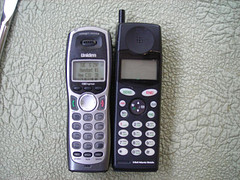
flickr.com/shortfatkid
Are you planning to cut the cord on your home business phone and go totally wireless? If you answered yes then you are not alone.
According to a survey made by the Cellular Telecommunications and Internet Association or CTIA, approximately 20 million Americans now rely on wireless phones as their only phone. Out of the 20 million, it seems that a higher percentage trends toward the younger generation.
There are no actual demographic numbers but apparently younger people with more mobile lifestyles are leading the list in the use of wireless phones.
You then ask about the rest of the population, what do they want? The decision of going wireless is obviously an individual one. Interested to know whether you are a good candidate? Let’s see if you’ll say yes to all or almost all of the following questions.
Would you consider yourself having a mobile lifestyle?
The first purpose of wireless phones is to combine convenience and portability in one neat package. This is why wireless phones are standing symbols of a mobile lifestyle.
If you frequently travel or are often out and about, you are probably in the perfect position to have a wireless phone. Who needs a corded phone when most people you know can reach you on your wireless phone?
Do you have a small household–and an even smaller home business?
The primary concern is the cost. Big households naturally mean more rooms that require phone installations.
For example, you have a spouse and two children, all of whom have a phone in their rooms. You can use extension phones with a single wired line. On the other hand, wireless phones would warrant four different phone lines, which lead to additional house expenses.
Some wireless phone companies actually offer family plans in an attempt to reduce the cost for multiple wireless phones in the household. If you have a big household, the cost would still be considerably higher compared to a single landline number.
Are you or your family members light to moderate users of telecom services?
Another cost issue is telecom usage. The majority of landlines have flat “all-you-can-talk” rate. Wireless phones tend to have bills competitive with most landline bills, but as you talk more, the cost increases more–sometimes dramatically.
The increase in phone call costs is charged at a per-minute basis. So if you choose to use a wireless phone, make sure that your telecom usage isn’t that big.
Are you okay with the occasional dropped call or bad reception?
Reliability is the main concern. A landline gives you a 100% chance of getting a dial tone. Wireless phones, however, have a higher chance of not getting a dial tone, and if your home business depends on a that call, that can be a deal-breaker for you. Consider all your options, and make a decision. Then you can begin rationalizing that decision so that you will be happy with it for years 🙂
Tagged with: wireless phone • work from home
Filed under: Home Business - MYO